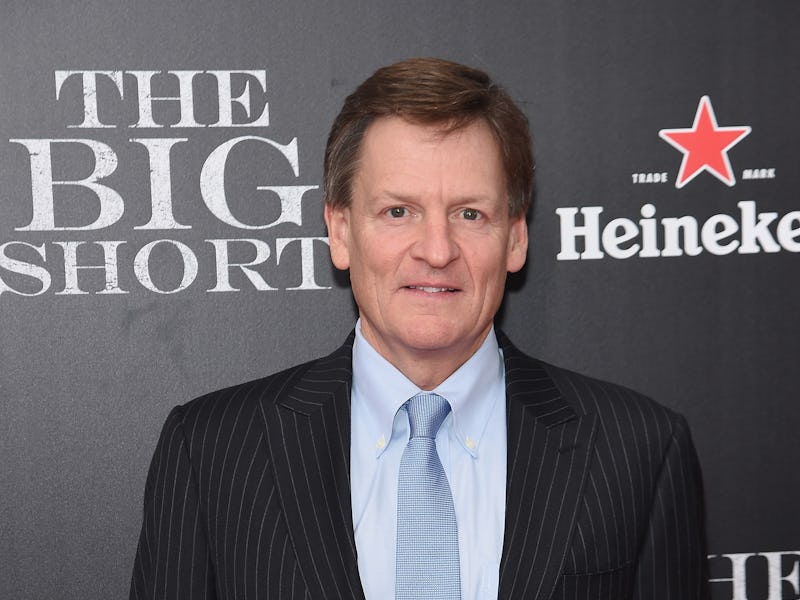Here's Why Movies Based on Michael Lewis Books Are Oscarworthy
'Moneyball,' 'The Blind Side,' and now 'The Big Short' solidified Lewis' source material as awards-season gold.

The Oscars are upon us, and while everyone has been talking about Leonardo DiCaprio sleeping in horse carcasses before eating raw bison liver, there’s another significant milestone that people seemed to have missed at this year’s ceremony. The Big Short is the third feature-length adaptation of a book by author Michael Lewis, along with The Blind Side in 2009 and Moneyball in 2011, to receive a Best Picture nomination. Two is a coincidence, three is a trend as they say, so what does this Lewis-apalooza mean exactly?
For one, it seems that Lewis’ books hew toward broadly appealing stories that translate well across multiple mediums. He’s the rare name-brand nonfiction author who dabbles in high concepts — the stock market cratering, baseball sabermetrics — while finding relatable story arcs amid the chaos of the real world.
Lewis’ ability to help readers easily grasp what they’re reading is beneficial when telling simple tales, as any good author knows, but it’s essential to the types of niche topics that Lewis tackles in his books and, by association, the Oscar-worthy movie adaptations as well.
It might be because Lewis, in the Malcolm Gladwell mold, excels at middlebrow nonfiction narratives that get prime real estate at airport bookstores. But more than Gladwell, he has a nose for dramatic characters and tension. A down-on-his-luck baseball manager taking an unorthodox approach to talent scouting, an underprivileged and disenfranchised youth finding his way via football, or the fortunes wagered and won on the 2008 financial crisis — all of these manage to tap into nonfiction stories with tragicomic appeal. This is, it turns out, an ideal Oscar sweet spot.
But it’s not always easy, and that’s the catch. Lewis explained his technique when he spoke to Vanity Fair about the two-part problem he faced during the writing of the source material for The Big Short. He said:
“One was the sheer complexity of modern finance: how to explain credit-default swaps and collateralized debt obligations to my mother? I’m actually not sure that my mother ever read The Big Short — she prefers mysteries — but she has always been my standard: if my mother can’t understand what I’m saying, there’s no point in saying it. The second, related problem was how to get my mother to want to understand credit-default swaps and collateralized debt obligations. It’s never enough to explain complicated things to a reader; the reader needs first to want to know about them. If the thing is seriously complicated, the reader must very badly want to know about it. My job, as I saw it, was to make the reader badly want to know about credit-default swaps and collateralized debt obligations. The marvelous characters who had foreseen the collapse of the financial system became the solution to both my problems. My reader (so I hoped) would feel it was worth trying to understand credit-default swaps because these enthralling characters were also trying to understand them.”
I’m not trying to undercut Lewis’ talent or the talent of the filmmakers who adapted his work. Turning Wall Street finance or baseball sabermetrics into an accessible narrative is even more difficult than giving the reader the information straight. It seems the same thing is right for movies too. How else do you think a book about the subprime mortgage bond market became a Best Picture nominee?
Directors looking to hop on the Lewis trend should take note; The Blind Side, Moneyball, and The Big Short aren’t the only books in his oeuvre that would make for great movies. Consider the potential of Home Game: An Accidental Guide to Fatherhood, his firsthand account of raising kids, or Liar’s Poker, the semi-autobiographical story of Lewis navigating the powerful investment firm Salomon Brothers in the 1980s, a straight-ahead contrast to the gonzo antics of The Wolf of Wall Street. Or consider The New New Thing, about the internet boom and Silicon Valley’s entrepreneurial culture, as a spiritual prequel to The Social Network. The list goes on.
As long as Lewis keeps writing, Hollywood will come calling. It doesn’t even really matter how The Big Short performs at the Oscars this Sunday. Moneyball went home empty-handed while The Blind Side landed just a single award, for Sandra Bullock. But if you consider it an honor to be nominated? Might as well reach for a Lewis bestseller for inspiration, probably during your next layover.